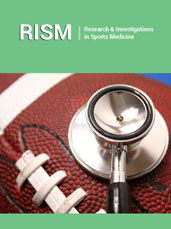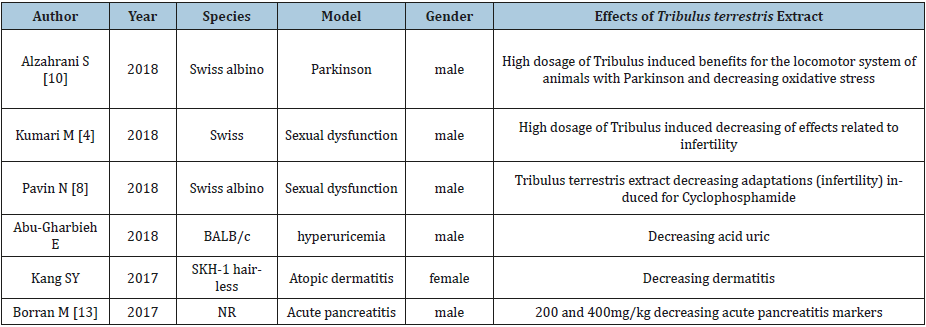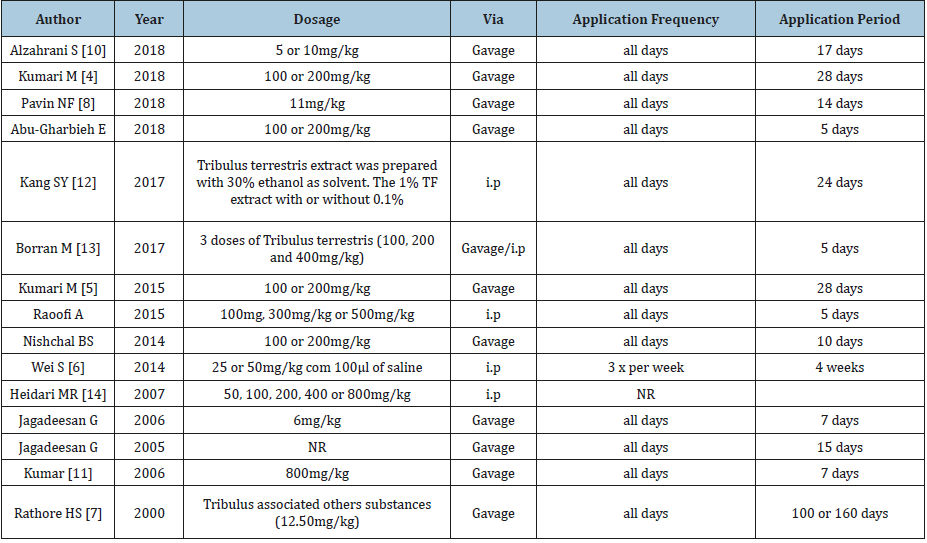- Submissions

Full Text
Research & Investigations in Sports Medicine
Effects of Herbal Supplement Tribulus Terrestris: A Mini Review
Bruno Nascimento Carvalho1,2*, Miguel Angel Condori Mayta1, Oscar Albuquerque de Moraes2, Adriano dos Santos1, Erico Chagas Caperuto1, Katia Bilhar Scapini1, Bruno Nascimento Lopes1, André Rinaldi Fukushima3,4 and Iris Callado Sanches1
1Human Movement Lab, Universidade São Judas Tadeu (USJT), Brazil
2Hypertension Unit, Heart Institute (InCor), University of Sao Paulo Medical School, Brazil
3Department of Pathology, School of Veterinary Medicine and Animal Science, University of São Paulo, Brazil
4Department of research and extension, Igesp Health Sciences College, Brazil
*Corresponding author: Bruno Nascimento-Carvalho,Human Movement Lab, Universidade São Judas Tadeu (USJT), Brazil
Submission: August 01, 2019;Published: September 19, 2019

ISSN: 2577-1914 Volume5 Issue3
Abstract
Terrestrial Tribulus is an herbaceous plant originally from India. It has been widely used as a natural sexual stimulant by the traditional medicine of China, India and Greece. Tribulus is now widely used mainly by athletes based on the belief that it can increase testosterone concentrations. However, there is no consensus on the real effects of this supplementation, so the aim of this research was to characterize the effects of Tribulus in experimental models. This mini review was performed in the PubMed database on 04/13/2019 with the terms: “Terrestrial Tribulus”, “mice” and their related terms. Only studies in Portuguese, Spanish, English, Italian and French were included. In addition, all in vitro studies, studies that did not demonstrate in the methodology the use of Terrestrial Tribulus supplementation and studies that were not obtained in full were excluded. With this search strategy, 33 articles were identified, from which 18 studies were excluded based on the eligibility criteria. The results showed a protective effect on the male reproductive system, increased antioxidant agents and anti-inflammatory effect induced by supplementation of Terrestrial Tribulus.
Keywords: Tribulus Terrestris, Male reproductive system, Oxidative stress, Inflammation
Introduction
The evidence of the positive effects of Terrestrial Tribulus supplementation in sexual performance, in decreasing oxidative stress and produce anti-inflammatory effects [1-3]. However. There is no consensus on the real benefits of supplementation, considering all its compounds. The aim of this mini review performed at PubMed was provide evidence in a controlled environment of the real effects, the search was performed in PubMed of on the day 13/04/2019 with Tribulus, Mice and their related terms. With this search strategy 33 articles were identified, from which 18 studies were excluded based on the eligibility criteria (were excluded studies in vitro and that not used Tribulus).
Discussion
Regarding the methodology proposed in the 15 studies included in this review (Table 1). We identified a consensus on the dose of supplement application (100 or 200mg / kg), of these studies 73.33% performed gavage on animals and almost all studies 86.66% applied the supplement daily, there was no standard for the period of supplement application (Table 2). However, this mini review provided performed interesting results. Only 33,3% of studies identified some positive effect induced by Terrestrial Tribulus supplementation related to male sexual dysfunctions, in all these studies Tribulus supplementation aided the recovery of the reproductive system of the animals or produced a protective effect [4-8].
Although some studies relate benefits in the male reproductive system to increased testosterone production, a recent clinical trial has shown that this supplementation only increases the availability of testosterone associated with other substances, and its positive effects on the male reproductive system would be associated with higher availability of nitric oxide [9]. An antioxidant effect was observed in three studies using different models (model of Parkinson disease, male sexual dysfunction model and chemo preventive model) [5,10,11]. The increased nitric oxide production and reduced oxidative stress may be and the determining mechanisms to reduce the inflammatory profile, it is worth mentioning that in models that induced some kind of inflammation (atopic dermatitis, acute pancreatitis and rheumatism) Tribulus supplementation was effective in reducing these deleterious effects [12-14]. Considering the specificity of sports context, the main benefits of Tribulus (decreased stress oxidative and inflammatory) apply in exercise training of high intensity, where athletes present an imbalance in oxidative stress, increased of agents pro-inflammatory and energy imbalance [15,16]. These contexts, the supplementation with antioxidant and anti-inflammatory agents it’s a strategy is effective in promotion protection for athletes, because it helps the return to homeostasis and consequently the maintenance of the performance [15,16].
Table 1:Characteristic and effects of the included studies.

NR: Not Reported by the Author
Table 2:Information’s of dosage, via of application, frequency and period of application supplement.

NR: Not reported by the author; i.p: Intraperitoneal
References
- Rogerson S, Riches CJ, Jennings C, Weatherby RP, Meir RA, et al. (2007) The effect of five weeks of Tribulus terrestres supplementation on muscle strength and body composition during preseason training in elite rugby league players. J Strength Cond Res 21(2): 348-353.
- Amin A, Lotfy M, Shafiullah M, Adeghate E (2006) The protective effect of Tribulus terrestres in diabetes. Ann NY Acad Sci 1048: 391-401.
- Kianbakht S, Jahaniani F (2003) Evaluation of antibacterial activity of Tribulus terrestres growing in Iran. Iran J Pharmacol Ther 2: 22-24.
- Kumari M, Singh P (2018) Tribulus terrestris improves metronidazole-induced impaired fertility in the male mice. Afr Heal Sci 18(3): 645-652.
- Kumari M, Singh P (2015) Tribulus terrestris ameliorates metronidazole-induced spermatogenic inhibition and testicular oxidative stress in the laboratory mouse. Indian J Pharmacol 47(3): 304-310.
- Wei S, Fukuhara H, Chen G, Kawada C, Kurabayashi A (2014) Terrestrosin D, a steroidal saponin from Tribulus terrestris, inhibits growth and angiogenesis of human prostate cancer in vitro and in vivo. Pathobiology 81(3): 123-132.
- Rathore H (2000) Prevention of toxic effects of mercuric chloride on Some male accessory organs in mice with a Multiherbal drug “Speman.” Anc Sci Life 20(1-2): 6-10.
- Pavin NF, Izaguirry AP, Soares MB, Spiazzi CC, Mendez ASL (2018) Tribulus terrestris protects against male reproductive damage induced by cyclophosphamide in mice. Oxid Med Cell Longev doi: 10.1155/2018/5758191.
- Qureshi A, Naughton DP, Petroczi A (2014) A systematic review on the herbal extract Tribulus terrestris and the roots of its putative aphrodisiac and performance enhancing effect. J Diet Suppl 11(1): 64-79.
- Alzahrani S, Ezzat W, Elshaer RE, Abd El-Lateef AS, Mohammad HMF (2018) Standarized Tribulus terrestris extract protects against rotenone-induced oxidative damage and nigral dopamine neuronal loss in mice. J Physiol Pharmacol 69(6).
- Kumar M, Soni A, Shukla S KA (2006) Chemopreventive potential of Tribulus terrestris against 7,12- dimethylbenz (a) anthracene induced skin papillomagenesis in mice. Asian Pac J Cancer Prev 7(2): 289-294.
- Kang SY, Jung HW, Nam JH, Kim WK, Kang JS, et al. (2017) Effects of the fruit extract of Tribulus terrestris on skin inflammation in mice with oxazolone-induced atopic dermatitis through regulation of calcium channels, Orai-1 and TRPV3, and mast cell activation. Evid Based Complement Altern Med doi: 10.1155/2017/8312946.
- Borran M, Minaiyan M, Zolfaghari B, Mahzouni P (2017) Protective effect of Tribulus terrestris fruit extract on cerulein-induced acute pancreatitis in mice. Avicenna J Phytomed 7(3): 250-260.
- Heidari MR, Mehrabani M, Pardakhty A, Khazaeli P, Zahedi MJ (2007) The analgesic effect of Tribulus terrestris extract and comparison of gastric ulcerogenicity of the extract with indomethacine in animal experiments. Ann N Y Acad Sci 1095: 418-427.
- Pingitore A, Lima GPP, Mastorci F, Quinones A, Iervasi G, et al. (2015) Exercise and oxidative stress: Potential effects of antioxidant dietary strategies in sports. Nutrition 31(7-8): 916-922.
- Huang WC, Wei CC, Huang CC, Chen WL, Huang HY (2019) The beneficial effects of Lactobacillus plantarum PS128 on high-intensity, exercise-induced oxidative stress, inflammation, and performance in triathletes. Nutrients 11(2): 1-13.
© 2019 Bruno Nascimento-Carvalho. This is an open access article distributed under the terms of the Creative Commons Attribution License , which permits unrestricted use, distribution, and build upon your work non-commercially.
 a Creative Commons Attribution 4.0 International License. Based on a work at www.crimsonpublishers.com.
Best viewed in
a Creative Commons Attribution 4.0 International License. Based on a work at www.crimsonpublishers.com.
Best viewed in 







.jpg)






























 Editorial Board Registrations
Editorial Board Registrations Submit your Article
Submit your Article Refer a Friend
Refer a Friend Advertise With Us
Advertise With Us
.jpg)






.jpg)














.bmp)
.jpg)
.png)
.jpg)










.jpg)






.png)

.png)



.png)






